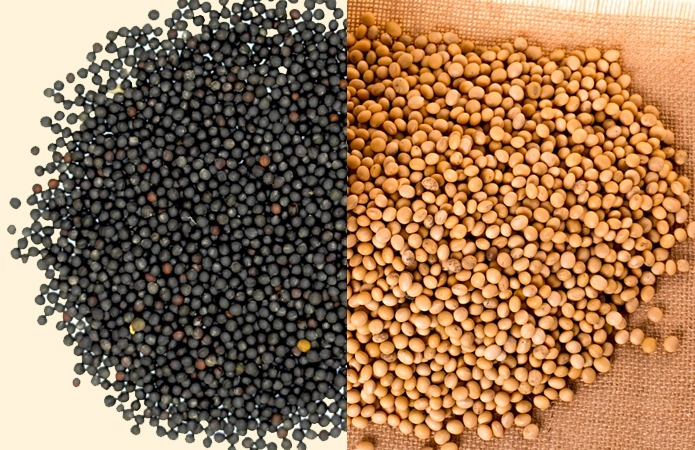"Soybean and rapeseed amendments" may reduce prices for these products in Ukraine by 10% starting July 1

On June 13, Deputy Chairman of the Verkhovna Rada Committee on Economic Development Dmytro Kysylevsky and MP Andriy Motovylovets submitted amendments to draft law No. 13134 "On Amendments to the Tax Code of Ukraine on Expanding Patients' Access to Medicines Subject to Procurement by a Person Authorized to Make Procurements in the Healthcare Sector by Concluding Managed Access Agreements," which provide for the introduction of a 10% duty on the export of soybeans and rapeseed, starting from July 1, 2025.
The deputies explain the introduction of such duties by the need to increase the utilization of processing capacities and as a response to the reinstatement of duties on Ukrainian agricultural products by the EU.
The introduction of duties will collapse the prices of rapeseed and soybeans (especially), since there are no opportunities to sell a significant amount of soybean meal in Ukraine. Therefore, a sharp drop in export prices for soybeans can be expected in the coming week.
Head of the Center for Food and Land Use Research at the Kyiv School of Economics, Oleg Nivʼyevsky, presented his assessment of the impact of 10% tariffs on the country's economy and market participants:
- UAH 4.3–4.4 billion — processors will win,
- Farmers will lose UAH 9.1–9.3 billion,
- UAH 4.1–4.7 billion will be received by the budget,
- from 200 to 500 million UAH - will be the country's net economic losses.
EU subsidies for the production of biofuels from rapeseed allow Ukrainian farmers to receive part of these subsidies in the price in case of export to the EU. And when rapeseed is processed in Ukraine, the price of rapeseed oil will no longer be subsidized, even in case of delivery to the EU. In addition, based on the geopolitical situation, Ukraine should not spoil relations with the EU, which is the main donor of the budget and military aid, especially against the background of deteriorating relations with the USA (unless these deputies received such an assignment from the FSB).
The Ukrainian Grain Association (UGA), the All-Ukrainian Agrarian Council (AAC), the European Business Association (EBA) and other public organizations sharply criticized such hasty and incomprehensible actions by deputies who are trying to put market participants in unequal conditions when exporting soybeans and rapeseed, and are also openly lobbying the interests of large agricultural holdings and processors.
The UGA appealed to the President of Ukraine, the government, and ministries with a request to make efforts to prevent the introduction of discriminatory duties, even in violation of the legislative procedure and contrary to the Agreements with the EU.
The UGA categorically opposes the proposed changes, which are economically, socially, and reputationally dangerous for the state and its international image, given the following risks:
- Discrimination against small and medium-sized producers who are unable to export their products independently and will be forced to sell them on the domestic market at low prices.
- The manipulative nature of the amendments, which creates artificial pressure on purchase prices in order to benefit individual agricultural holdings and processors at the expense of farmers.
- The more buyers or export options for oilseeds, the greater the liquidity of the products and, as a result, the greater the competition in demand, which will increase the producer's profits and have a positive impact on both the community and state budgets.
Opposition to Ukraine's European Integration
- Violation of the terms of the Association Agreement with the EU, which explicitly prohibits the introduction of new permanent export duties. At the same time, the amendments do not contain time limits and in fact introduce duties on a permanent basis, which creates a risk of aggravation in negotiations on the renewal of free trade conditions with the EU. In addition, the changes are adopted at the very time when Ukraine is discussing new terms of the free trade agreement with the EU, which may lead to the breakdown of negotiations. Accordingly, the private interest of several market operators is given priority over the national interest of Ukraine in deepening integration with the EU.
- The EU may respond, in particular in the form of import duties on Ukrainian soybean and rapeseed products, which is already being discussed by European industry associations.
Destruction of trust
- Questionable legislative procedure, including hasty amendments to a non-core bill, lack of transparent discussion, and ignoring the position of the business community, undermine trust in the Verkhovna Rada and raise suspicions about the personal interests of individual parliamentarians.
Therefore, the proposed measures not only fail to achieve their stated goals, but also distort competition, oppress small producers, and reduce overall foreign exchange earnings.
In connection with the above, UGA calls on behalf of the grain community:
The Verkhovna Rada of Ukraine – to reject the amendments on export restrictions as violating the Rules of Procedure of the Verkhovna Rada and threatening the economic security of the state.
The Government of Ukraine should initiate an open dialogue with business before making decisions in the field of foreign trade.


